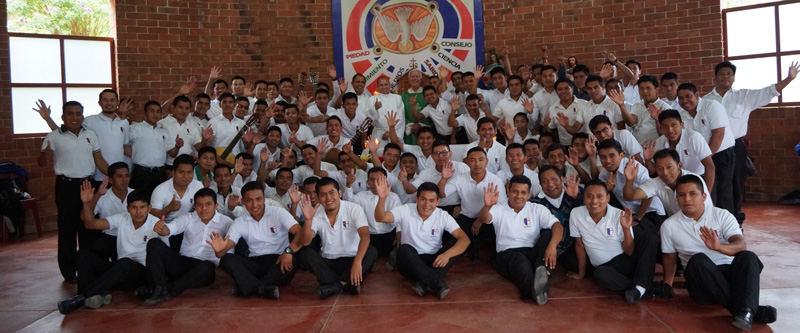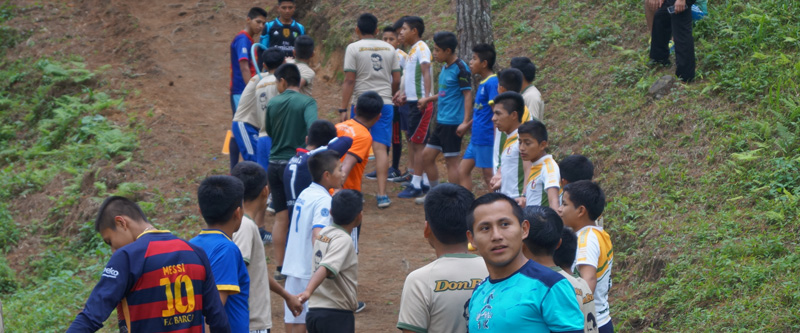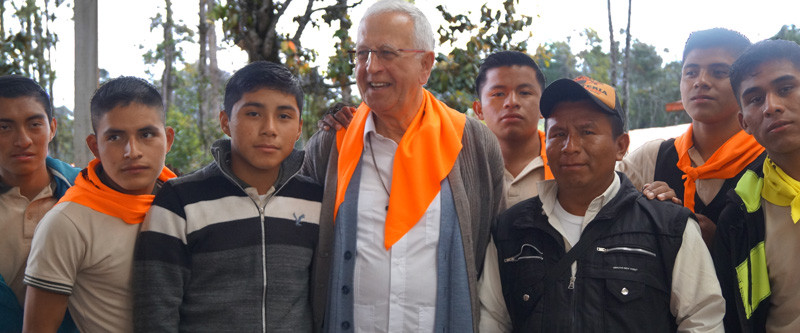Fr Tony DeGroot, Missionary to Guatemala
Fr Tony De Groot is a Salesian priest who has been quietly empowering thousands of some of the world’s poorest young people for over 45 years, living and working amongst the indigenous Q’eqchi’ people of Guatemala, in Central America. Recently, he returned to Melbourne for a quick refresher; a reunion with family, a health check-up and to touch base with friends from long ago!
Of course, one does not simply just dedicate the bulk of one’s life to a remote part of the world on a whim. After the successful completion of his novitiate, philosophy and practical training, Tony went (as did all Australian Salesians at the time) to Columbus, Ohio, USA to study Theology. During this time, Tony became interested in Latin America and received permission from his superiors to travel south to El Salvador and Guatemala for the semester break on a holiday. Years later, after the successful completion of his degree and final profession, he volunteered to join the Salesian missions. With Guatemala already being somewhat familiar, it was a logical choice and so a 5 year plan was drawn up; one that, as it turned out, went more than a little bit over time!
It’s not so much the enjoyment of the work, or the culture that brings about such a drastic life change. “You learn the language (Spanish as well as the native Que’echa) and you become committed, you become committed to the community and also the culture… I would have also been very happy to come back to work in the Australian province, but over there, there were fewer priests working in the mission”.
As with all things, the workloads and level of involvement have changed throughout Tony’s time away. Nowadays, he oversees three boarding schools, caring for approximately 1500 students, and has been an active presence in over 50 communities around the diocese. His main focus are the boarding schools, as this is the best way in which the neediest and the most marginalised of people can be helped. Due to the remote nature of many of the villages, minimal roads and communication technologies make it extraordinarily difficult to reach them and so, the students simply stay at the school. On average, everything required for a day’s worth of education for any given child equals to about 7 Australian dollars ‒ this figure includes teachers’ wages, food, workshop materials, general maintenance and so on.
The three schools are all secondary schools; they offer education as well as trades such as carpentry and electrical skills. These, Tony believes, are the entire point of the Salesian Congregation’s mission in such areas: “give them something practical, so they can get some work!” He has found this to be a winning formula; not only do many end up with lifelong employment in a region characterized by extremely high unemployment rates, but quite a number of the students are able to maintain their work and income as they then go on to study at university.

It comes as no surprise then, that Tony frequently receives messages from grateful students on Facebook or Messenger or even WhatsApp, even from those who have since left Guatemala for greener pastures. “It’s a wonderful thing and a source of great encouragement” he says, as he fondly relates one story. Someone said “Look, when I was a student I wasn't all that obedient, but now that I'm a father of a family and I look back, I'm very grateful for all that I've learned there; I can see that it's very useful for me now.”
This of course, is very much the Salesian preventive system at work. “We treat them in a way they feel they're very appreciated… Having hundreds of boarders would sound like a very difficult thing, but it is an easy task to look after them. We have almost no disciplinary problems. We've had some past students go to the city in Guatemala and participate in schools there, and when they came back, the boys they’ve returned to all seemed like saints!” The boys are not only treated well, but also treated to fantastic facilities; the centres are surrounded by sports fields that allow for social (non-competitive) sport every day, where everyone plays ‒ not just the best. In fact, one of the greatest signs of the success of the schools can be seen in the long-term; there is a significant number of past pupils who have also sent their children to the schools!
An average week for Tony is a very busy week. On Mondays, the people from the parish come for different reasons, so he makes himself available to them all day for whatever they may need. Tuesdays are the Salesian community days, when the eight Salesians working in the rural region come together to pray, to plan, to catch up and, once a month, to go on retreat. On each Wednesday, Thursday and Friday, Tony spends a full day in each of the schools. They are up to three hours away from one another, so a lot of time is spent on the road. Clearly, he is no longer in the position to be able to teach; however, he uses his experience to check up on how things are going in each centre, and to assist in organizing, planning and evaluating. This involves liaising with the coordinators and the (roughly) 200 workers who are a part of the school staff.
On top of the work related to managing a school environment, Tony has somehow also found time to minister to the locals on the weekends. Saturdays and Sundays have often been spent travelling between rural villages, offering catechesis and celebrating the sacraments, as required by the community. He hopes to pass this work soon soon to other Salesians in order to concentrate fully on the schools. Whilst it is “wonderful work and I like it, you can’t do everything!” he says with a wry smile.
Tony has found that some of the challenges that face the church in Australia are also rearing up in Guatemala. There are fewer Salesians working in the missions than there were a few years back, and yet the general population continues to grow. More work to do, with less people to do it! Fortunately, a feature of the Guatemalan church is that it is well managed by lay people. They have a very active participatory role, a necessity, Tony says, that is a great advantage. “You have a very well-planned pastoral organization: you have pastoral work or activities for young people, preparation for baptisms and for marriages. We visit and participate and help with planning. We are involved, but we do not have to be directly involved every time!”
The remote nature of many of the villages also exacerbates this feature. Given that he (and the other Salesians working in the region) have 50 villages to visit, he gets to each one at least roughly twice a year, and the bigger ones every two months. Yet, every Sunday the various communities still gather, celebrate the liturgy of the Word and extraordinary ministers for Communion are present. The communities are extremely religious, and will have Communion every three to four weeks, but are united by their joint work in keeping the church alive in their society.

And so, it is in this faith of the Q’eqchi’, accompanied in the purest sense of the term by Fr Tony deGroot, that we can find a lot to learn. The work of the Church has never been more important. The efforts of modern-day saints have never been more vital. Young people will always cry out for a sense of meaning and belonging bigger than themselves. However, it is up to both religious and lay people, working, socializing and journeying together, to strive for the mission Jesus left his Church.
Have you thought about becoming a Salesian brother or priest? Would you simply like more information?
Click here!
 Republished from the Australian Salesian Bulletin - Winter 2019
Republished from the Australian Salesian Bulletin - Winter 2019
Read or Download the Salesian Bulletin
Subscribe for FREE to the Salesian Bulletin

